
Guests
- Stephen Cohenprofessor emeritus of Russian studies and politics at New York University and Princeton University. His most recent book, Soviet Fates and Lost Alternatives: From Stalinism to the New Cold War, is out in paperback.
- Anton ShekhovtsovUkrainian citizen who just got back earlier this month from observing the protests in Kiev. He joins us from London, where he is a researcher at the University College London specializing in studying the far right.
Ukrainian anti-government protesters have rejected an amnesty bill aimed at ending the country’s political unrest, refusing to vacate occupied government buildings and dismantle their street blockades in exchange for the release of jailed activists. The demonstrations in the Ukraine are collectively referred to as “Euromaidan.” They began in late November after President Viktor Yanukovych reversed his decision to sign a long-awaited trade deal with the European Union to forge stronger ties with Russia instead. While the Ukrainian opposition has been hailed in the West as a democratic, grassroots movement, we host a debate on whether the rush to back opponents of Russian President Vladimir Putin obscures a more complex reality beneath the surface. We are joined by two guests: Stephen Cohen, professor emeritus of Russian studies and politics at New York University and Princeton University; and Anton Shekhovtsov, a Ukrainian citizen and University College London researcher who has just returned from observing the protests in Kiev.
Transcript
AMY GOODMAN: We turn now to Ukraine, where thousands of anti-government demonstrators have constructed what amounts to a self-sufficient protest city within the capital, Kiev. The standoff prompted the country’s prime minister to resign on Tuesday. Its parliament has agreed to repeal a round of laws that cracked down on dissent. On Wednesday, lawmakers offered an amnesty to protesters who have been arrested during the standoff, but only on the condition that activists vacate buildings they’ve occupied in Kiev and other parts of Ukraine. This is the speaker of the Parliament, Volodymyr Rybak.
VOLODYMYR RYBAK: [translated] Let me remind you that yesterday we have approved the bill number 4007 about the law of Ukraine that ceased to be in force. We have also agreed to discuss today the questions related to the “removal of the negative consequences and non-admission pursuit” and punishment of persons in relation to the events, which took place during peaceful rallies. So, I come up with a proposition to vote on legislation without discussion. I ask people’s deputies to vote.
AMY GOODMAN: The government’s amnesty offer was an attempt to get people to remove their barricades and tents from the main protest zone in Kiev. But so far, demonstrators have vowed to continue their occupation.
STEPAN: [translated] If the authorities had shown honesty, according to the mandate they were given, we would trust them. But now they have compromised the guarantees. We have no trust in these authorities. We have doubts in their honesty and decency, and that’s why it’s risky. So we are not leaving. That’s for sure.
VASIL: [translated] People came here so that all of them would be gone, so that the president would be gone and the government would be gone. We need full change. We cannot go on like this.
AMY GOODMAN: The demonstrations in Ukraine are collectively referred to as “Euromaidan.” They began in late November after President Viktor Yanukovych reversed his decision to sign a long-awaited trade deal with the European Union in a move that favored stronger ties with Russia instead. The protests rapidly grew in size after a violent police crackdown. While nationalists led the demonstrations at first, others have since joined the movement. At least five protesters have been killed in clashes with police; hundreds have been injured. Police have also attacked dozens of journalists, destroyed their equipment. As tensions continued to increase on Wednesday, Ukraine’s first post-independence president, Leonid Kravchuk, emphasized the seriousness of the crisis.
LEONID KRAVCHUK: [translated] The situation is, frankly, very dramatic. All the world acknowledges, and Ukraine acknowledges, that the state is on the brink of civil war. There are parallel authorities in the country, and there is a de facto uprising. When the power is taken over, which is a real fact, when the power is falling down and the constitutional authorities refuse to honor their responsibilities, it becomes clear that this is a fall of the power. This is simply a revolution.
AMY GOODMAN: For more, we’re joined by two guests.
Here in New York, Stephen Cohen is with us, professor emeritus of Russian studies and politics at New York University and Princeton University. His most recent book, Soviet Fates and Lost Alternatives: From Stalinism to the New Cold War, is now out in paperback. He recently wrote “A Letter to 'The New York Times'” that was critical of its editorial on Ukraine and Russian President Vladimir Putin’s role in the country.
Joining us from London, Anton Shekhovtsov, a Ukrainian citizen who just got back earlier this month from observing the protests in Kiev. He’s a researcher at the University College London specializing in studying the far right. He recently wrote a piece titled “What the West Should Know About the Euromaidan’s Far Right Element.”
Anton Shekhovtsov, Stephen Cohen, welcome both to Democracy Now! Let’s begin with Anton in London. What should people understand?
ANTON SHEKHOVTSOV: Well, first of all, thank you for the invitation to Democracy Now!
I wrote the piece to highlight a very dangerous trend, in my opinion, is that many people in the West buy into Russian propaganda which is saying that Euromaidan is infiltrated by the neo-Nazis and anti-Semites. And this is completely untrue. There is a far-right element in the Euromaidan protests, but it is a minor element. And Euromaidan protest is basically a multicultural, democratic movement which is trying to build a new Ukraine, a democratic Ukraine. And sometimes, by the name “far right,” there goes Ukrainian nationalism, and Ukrainian nationalism has—its main thrust is building of a truly independent Ukraine, a Ukraine which would be a national democratic state and not a colony of Russia, as Ukrainian nationalists think Ukraine is.
So the move towards Europe is a move towards democracy and away from the authoritarianism of Russia and its projected Eurasian union, which would unite several authoritarian states, like Belarus, Kazakhstan and Russia. So Ukrainians do not want this. They want to be away from authoritarianism, and they struggle for democracy now in Ukraine. So, basically, Ukraine is now a front line of democratic Europe. And they’re not—Ukrainians are not only fighting for their own freedom, but they are fighting to stop authoritarianism to spread westwards.
AMY GOODMAN: Stephen Cohen, what is your take on what’s happening in Ukraine right now?
STEPHEN COHEN: Well, it’s not what Anton said. Where to begin? Can we begin at the beginning? What’s happening in Ukraine, what’s been unfolding since November in the streets, is probably the single most important international story underway today. It may impact for a very long time the geopolitics of Europe, Russia, American-Russian relations, and a lot more. At the same time, media coverage of this story, particularly in the United States, has been exceedingly misleading, very close to what Anton just told you. I would characterize Anton’s characterization, to be as polite as I can, as half-true. But a half-truth is an untruth.
The realities are, there is no “the Ukraine.” All this talk about Ukraine is on the front line of democracy—there are at least two Ukraines. One tilts toward Poland and Lithuania, the West, the European Union; the other toward Russia. This is not my notion. This is what every public opinion poll has told us since this crisis unfolded, that about 40 percent of Ukrainians want to go west, 40 percent want to stay with Russia, and, as usually true in these polls, 20 percent just don’t know or they’re not sure.
Who precipitated this crisis? It was the European Union, in this sense. It gave the Ukrainian government, which, by the way, is a democratically elected government—if you overthrow this government, just like they overthrew Morsi in Egypt, you’re dealing a serious blow to democracy. So if the crowd manages to essentially carry out a coup d’état from the streets, that’s what democracy is not about. But here’s what the European Union did back in November. It told the government of Ukraine, “If you want to sign an economic relationship with us, you cannot sign one with Russia.” Why not? Putin has said, “Why don’t the three of us have an arrangement? We’ll help Ukraine. The West will help Ukraine.” The chancellor of Germany, Merkel, at first thought that was a good idea, but she backed down for various political reasons. So, essentially, Ukraine was given an ultimatum: sign the EU economic agreement or else.
Now, what was that agreement? It would have been an economic catastrophe for Ukraine. I’m not talking about the intellectuals or the people who are well placed, about ordinary Ukrainians. The Ukrainian economy is on the brink of a meltdown. It needed billions of dollars. What did the European Union offer them? The same austerity policies that are ravaging Europe, and nothing more—$600 million. It needed billions and billions.
There’s one other thing. If you read the protocols of the European offer to Ukraine, which has been interpreted in the West as just about civilizational change, escaping Russia, economics, democracy, there is a big clause on military cooperation. In effect, by signing this, Ukraine would have had to abide by NATO’s military policies. What would that mean? That would mean drawing a new Cold War line, which used to be in Berlin, right through the heart of Slavic civilization, on Russia’s borders. So that’s where we’re at to now.
One other point: These right-wing people, whom Anton thinks are not significant, all reports—and I don’t know when he was in Ukraine, maybe it was long ago and things have gone—but the reports that are coming out of Ukraine are the following. One, the moderates—that’s the former heavyweight champion boxer, Vitali Klitschko, and others—have lost control of the street. They’ve asked the people who have been attacking the police with Molotov cocktails, and to vacate the buildings they’ve occupied, to stop. And the street will not stop, partly because—I’d say largely because—the street in Kiev is now controlled by these right-wing extremists. And that extremism has spread to western Ukraine, where these people are occupying government buildings. So, in fact, you have a political civil war underway.
What is the face of these people, this right wing? A, they hate Europe as much as they hate Russia. Their official statement is: Europe is homosexuals, Jews and the decay of the Ukrainian state. They want nothing to do with Europe. They want nothing to do with Russia. I’m talking about this—it’s not a fringe, but this very right-wing thing. What does their political activity include? It includes writing on buildings in western Ukraine, “Jews live here.” That’s exactly what the Nazis wrote on the homes of Jews when they occupied Ukraine. A priest who represents part of the political movement in western Ukraine—Putin quoted this, but it doesn’t make it false. It doesn’t make it false; it’s been verified. A western Ukrainian priest said, “We, Ukraine, will not be governed by Negroes, Jews or Russians.” So, these people have now come to the fore.
The first victims of any revolution—I don’t know if this is a revolution, but the first victims of any revolution are the moderates. And the moderates have lost control of what they created, helped by the European Union and the American government back in November. And so, now anything is possible, including two Ukraines.
AMY GOODMAN: Anton Shekhovtsov, can you respond to Professor Stephen Cohen?
ANTON SHEKHOVTSOV: Yes. So, this is basically what I said, as I called as a distortion in the Western media. I don’t know if Professor Cohen have been in Ukraine. I’ve been to Ukraine just a few days ago. I haven’t seen that the right-wingers have taken control of the streets. The streets are controlled by Euromaidan, which is ideologically very different. There is a right-wing element, but this is the element which is only a minor component of Euromaidan. And if you remember the Solidarity movement in the ’80s in Poland, it also comprised some right-wing elements, but in the end they built a democratic national—national democratic Poland.
As for the neo-Nazis and anti-Semites in western Ukraine, there are some, but at the same time, if you talk to them, if you interview them, and if you read their demands, you will not find any discrimination laws among their demands. What they demand is the national democratic state, independent from Russia. Even if they say that they are against the European Union, they at the same time support the pro-European protests. And this is partly what Euromaidan is about.
And then, again, there are many false reports about the beatings of representatives of national minorities in Ukraine. And mostly these reports are all false. They are being spread by Russian-backed propagandists, like Viktor Medvedchuk, leader of the pro-Eurasian, pro-Russian party, Ukrainski Vybir, Ukrainian Choice. So, these people, they’re trying to distort the image of Euromaidan and picture it as something very violent, as something very right-wing, although the right-wing element, as I said, is a minor element at Euromaidan.
AMY GOODMAN: Professor Richard Cohen—
STEPHEN COHEN: Stephen.
AMY GOODMAN: Professor Stephen Cohen—
STEPHEN COHEN: Richard Cohen writes for The Washington Post. We are completely different people.
AMY GOODMAN: But he’s not a professor, so—
STEPHEN COHEN: No, we’re still different people.
AMY GOODMAN: Stephen.
STEPHEN COHEN: Yeah, thank you, Amy.
AMY GOODMAN: Can you respond to what he’s saying? And also talk about how people are informed here, largely through the media, the media coverage of what’s happening in Ukraine.
STEPHEN COHEN: I’ve already responded to what Anton has said. To me, it’s a fundamental misrepresentation, and it raises questions in my mind, though he’s entitled to his political allegiances, who he represents in Ukraine. He is clear where he stands. But even the American media, which deleted this right-wing element for two months, now has gotten worried about it. There was an article in Time magazine, I think the day before yesterday. I think, because I saw it on the Internet, but today’s New York Times, January 30th New York Times editorial, is now worried about these people. So, Anton is not worried about them, for his own reasons, but the plain reality is that the so-called moderates, who are democratic, have lost control of the situation.
And here’s the evidence. The moderate leaders, including Klitschko, the boxer, who wants to be president of Ukraine, entered into a negotiation with Yanukovych, the democratically elected president of Ukraine. And what did he offer them? He offered them a coalition government, which is a traditional democratic solution to such a crisis. He said, “We will give Klitschko and the other Ukrainian democratic leader the prime ministership and the deputy prime ministership.” That’s a colossal concession. It’s power sharing. That’s what you do in a crisis. They didn’t accept. Now, they didn’t accept for several reasons.
AMY GOODMAN: The protesters didn’t accept.
STEPHEN COHEN: No, wait a minute. Klitschko and the other democratic leader didn’t accept. One reason, the main reason, is the street wouldn’t accept it. And since both of these guys want to be president, when there’s elections in 2015, if there are elections, they’re not going to go against the street. They’ve become captives of the street. Now, the street, increasingly, is in the control of these right-wingers.
Let me make a point, and it would be interesting to hear what Anton thinks about this. Many young thugs in the street are trying to kill policemen. They’re throwing Molotov cocktails at them. They’re beating them up. Now, the police are brutal also. But name me one democratic country that would allow mobs to attack policemen in the street of a capital city and not crack down? And, in fact, the Ukrainian police haven’t cracked down.
AMY GOODMAN: Anton Shekhovtsov, your response?
ANTON SHEKHOVTSOV: Well, the police has already cracked down on the protesters at the end of November, when peaceful protesters were brutally beaten by the riot police. They did not do anything except for staying on the Independence Square in Kiev, and they were beaten up. And some people have disappeared. And since then, since the end of November, there are tens of, dozens of people who have been kidnapped by the police, and now they are found sometimes frozen to death with their hands tied at their backs. So, there is a whole campaign of state terror going on in Ukraine. And more than five people were killed already.
And Arseniy Yatsenyuk, one of the whom—one of the politicians whom Professor Cohen called the moderates, he was offered a position of prime minister. But Ukraine is a presidential republic, so the whole power, the whole political power, is in the hands of President Viktor Yanukovych. So this position is not really powerful. A prime minister does not have any influence on politics and on the way Ukraine develops.
STEPHEN COHEN: Amy, I—
ANTON SHEKHOVTSOV: So, it wasn’t really a concession.
AMY GOODMAN: Stephen Cohen?
STEPHEN COHEN: Yeah, Anton may have been in Ukraine a week ago, but he’s completely out of touch. Part of the deal that Yanukovych offered the moderates was to change the constitution to deprive the president of the power he now has and switch it to the prime minister. So—
ANTON SHEKHOVTSOV: This is completely untrue. This is simply untrue.
STEPHEN COHEN: Please—it’s not untrue. I mean, I’ve read the documents. I’ve read the speech. It hasn’t gone through. It’s still at the Parliament. They may vote on it; they may not. But you’re simply not representing the situation correctly.
ANTON SHEKHOVTSOV: Well, I am representing the situation correctly, because I’ve been there. I’ve seen all the documents that were being discussed in the Parliament. And President Yanukovych never offered to go back to the constitution of 2004, which would reintroduce the parliamentary republic. He wants all the power he’s got during three years of his rule. He has now control of all the oligarchic business in Ukraine. He’s trying to build—he was trying to build a whole business empire and give his family and the oligarchs and businessmen connected to the family all the economic power in Ukraine. So, of course, he is now—will be fighting 'til death, because if he loses, his family is losing—will lose all the money that they've stolen from Ukrainian people and invested it in European banks, invested it in European businesses, as well as American businesses, as well.
AMY GOODMAN: I want to—I want to get Stephen Cohen’s response to last month Senators John McCain and Christopher Murphy visiting the protesters at their hub in Kiev’s Independence Square and voicing support for their cause.
SEN. CHRISTOPHER MURPHY: We are here to tell you that the American people and the United States Congress stands with the people of Ukraine.
SEN. JOHN McCAIN: I am a Republican. Senator Murphy is a Democrat. We are here together speaking for the American people in solidarity with you.
AMY GOODMAN: Professor Stephen Cohen?
STEPHEN COHEN: Well, that’s Anton’s position. I mean, Anton represents—at least his description of the situation—the mainstream American media political view of what’s going on in Ukraine. And when I say “mainstream,” I mean it extends from the right wing in America to MSNBC, to the so-called liberals and progressives, to Bill Maher, who did this on his show the other night. There’s no alternative voice in America, except what I’m trying to say to you today. It’s wrong—it’s wrong factually, it’s wrong in terms of policy—for McCain to go, as he’s done in other countries. He once said, “We’re all Georgians.” Now he’s saying, “We’re all Ukrainians.” If he understands the situation in Ukraine—and he may not—then he’s being reckless.
But a true understanding of Ukraine begins with the fact that there are at least two Ukraines, two legitimate Ukraines, culturally, politically, ethnically, economically, culturally. This isn’t Putin’s fault. This isn’t Yanukovych, the president of Ukraine’s fault. It’s either God’s fault, or it’s history’s fault. This is what came down through the centuries. The situation has been explosive since the end of the Soviet Union 22 years ago. When Western politicians go there, they’re playing with fire, metaphorically, and now they have real fire.
AMY GOODMAN: Do you think this is about the media’s vilification of Putin?
STEPHEN COHEN: I think that the vilification of Putin in this country, demonization, is the worst press coverage by the American media of Russia that I’ve seen in my 40 years of studying Russia and contributing to the media. It’s simply almost insane. This idea that he’s a thug—
AMY GOODMAN: Ten seconds.
STEPHEN COHEN: —and that explains everything, passes for analysis in America today—
AMY GOODMAN: We have to leave it there. I want to thank you very much, Stephen Cohen, as well as Anton Shekhovtsov, for joining us to talk about Ukraine. We’ll continue to follow it.

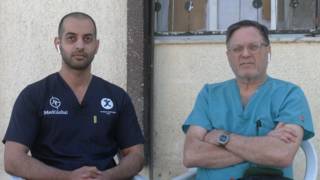
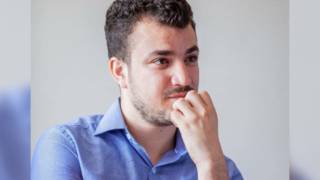
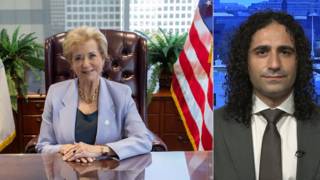
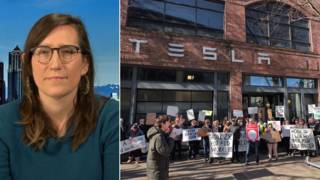





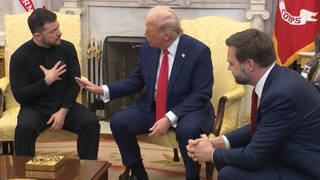
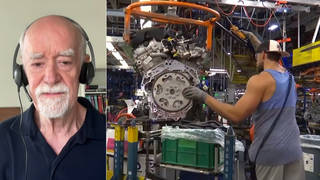
Media Options